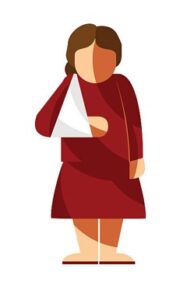Turns out, you can teach an old dog new tricks. It just requires sufficient motivation followed by some determination.
Lessons from Rotator-Cuff Surgery
 I learned this the hard way on November 3, when I had rotator-cuff surgery on my right (and dominant) arm. Along the way, I learned a few other things.
I learned this the hard way on November 3, when I had rotator-cuff surgery on my right (and dominant) arm. Along the way, I learned a few other things.
- Don’t listen to other people. For some reason, folks I know who had been through this surgery felt compelled to tell me how excruciatingly painful it is. I experienced no such thing. I felt pain, certainly. But by the time the nerve block wore off, the pain had diminished to where a couple of Tylenol took care of it. I never needed any opiates, which is just fine with me.
- Join the club. Until you show up with your arm in a big black sling with a thick pad that holds your arm away from your body, you can’t realize how many other people have gone through this. Even strangers, seeing the sling, stop to tell you about their or their spouse’s rotator-cuff surgery. I would have preferred to avoid joining this particular club but, here I am.
Hospital Tales
- Ask to stay overnight. The insurance companies, as we all know, run the medical profession. They mandate that surgical patients go home the same day as the surgery. I think this is barbaric. We asked if I could stay overnight in the post-surgical ward and my doctor agreed. It made a huge difference. The nurses kept the ice machine going, ran an IV drip, monitored my vital signs and pain level, helped me to and from the bathroom and otherwise took great care of me. I met with both physical and occupational therapists the next morning. When I left that afternoon, I felt ready to go and begin the recovery.
- Your hospital roomie might snore. Mine did. A delicate, feminine woman, she snored like a longshoreman interspersed with bouts of sleep apnea and talking in her sleep. I spent most of the night sitting up and reading. Fortunately, I had a good book.
Adjusting to the Sling
 You can train your non-dominant arm. My left arm has become quite adept at doing things it never attempted before. Of course, I exercise a lot and thus was stronger than many surgical patients. Also, I did flexibility stretches, so I could reach and bend quite easily. Still, you don’t know how many things you do that require both hands until you can’t use one of them. Stop. Rethink, Use the other arm. That gets me through a lot of obstacles.
You can train your non-dominant arm. My left arm has become quite adept at doing things it never attempted before. Of course, I exercise a lot and thus was stronger than many surgical patients. Also, I did flexibility stretches, so I could reach and bend quite easily. Still, you don’t know how many things you do that require both hands until you can’t use one of them. Stop. Rethink, Use the other arm. That gets me through a lot of obstacles.- Be patient. This is ironic. If I had patience, I wouldn’t be in this sling. But the second thing all the other folks say is that recuperation takes about six months. My doctor concurs. But tomorrow starts my third week of recovery, so I’m making progress.
Making the Right Choice
The other thing I think about is how a person’s life can change on a dime. Make one decision and all is good; make the opposite choice and bad things happen. Go left instead of right. Stay home or go out. Say yes instead of no. Look up or watch your feet.
 Small things make a difference. In my case, I was at the corner of Newbury and Clarendon Streets in Boston’s Back Bay, on my way to lead a walking tour for Boston By Foot. For some reason, a group of young people was milling around the corner as if they didn’t understand how to cross the street. Impatient, as always, I decided to walk around them and cross with the light.
Small things make a difference. In my case, I was at the corner of Newbury and Clarendon Streets in Boston’s Back Bay, on my way to lead a walking tour for Boston By Foot. For some reason, a group of young people was milling around the corner as if they didn’t understand how to cross the street. Impatient, as always, I decided to walk around them and cross with the light.
I tripped—on what I still don’t know—and went sprawling in the street. Breaking the fall with my arms resulted in tearing the bicep tendon from its place on the rotator cuff, along with some other damage. Had I just stood back and waited for them to sort themselves out, it would not have happened. Wait or cross: a small choice with big repercussions.
Planning Recuperation
Even though the fall happened at the end of May, I had to go through weeks of physical therapy before I qualified for an MRI. The insurance companies strike again.,
Once diagnosed, I waited to have the rotator-cuff surgery until after the cruise ship season in September and October so I could work as a tour guide and make some travel money. That means I have gone from being out of the house and busy nearly every day to sitting around reading, watching TV, and doing a jigsaw puzzle left-handed. It makes for a big change and I’m feeling antsy.
This time, however, I’m forced to be patient. I have no choice. Now I look forward to starting physical therapy in two weeks, pain or no pain. I’m better at doing than at sitting and that gives me a goal. Six months of recuperation, here I come.
